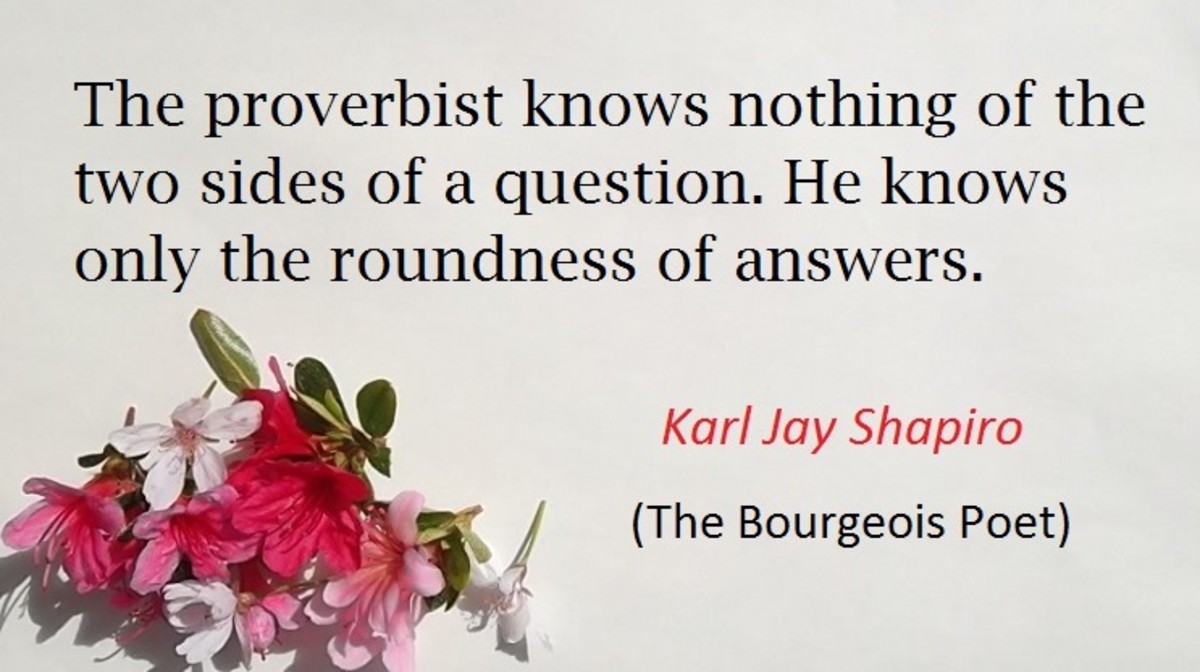Sentence Sermons (Christian Inspiration) #26 --- Contentment
Quotations on Contentment
Contentment does not signify indifference. It does not mean mere listless acceptance. It implies a satisfaction in doing the best that can be done under given circumstances. One may not be able to make circumstances, but he can usually capitalize on them. Reconciliation–cheerful adjustment! Through faith and works, these are always possible. The man who is able to reconcile himself to his lot has gone a long way toward success. The one who, from the standpoint of his own personal advantage, plans his experiences in advance and then is disappointed because his plans do not work, must live to learn that there is only one right way in life, and that is to make most of the opportunities presented from day to day whatever they may be. If something wholly unexpected happens, this is not a signal for despair--it is the call for greater resourcefulness and for a faith that knows no defeat.
—Frank Evans, Eastern Ensign, New York, N.Y., August 1940.
Fertilize the tree of life with kindliness, water it with human sympathy, cultivate it with initiative and earnest effort; prune it with the shears of moderation, spray it with unselfishness, and it will bear riotously the gorgeous blossoms of successful contentment.
—W.A. MacKenzie, Florida Times-Union, Jacksonville, Fla., April 2, 1923.
It is not the amount of one's income which determines whether or not he can live within his means, but one's ability to contain himself–to be content in whatsoever state he finds himself.
—George S. Benson, The Bison, Searcy, Ark., Jan. 21, 1941.
Happiness is a byproduct of work. Contentment is a plant that grows above the ground. It does not bloom far up in the delectable mountain, but right at our feet–although too often the paunch of our pride is so distended that we cannot see it. ... Contentment is a byproduct of work.
—Frank Crane, American Magazine, Springfield, Ohio, February 1920.
Contentment [is] that peaceful hour at the end of the day when memory brings no indictment of a mean act, of a false move, of a sordid deed with no vision of accusing faces whose sorrows are laid upon the conscience.
—Burris A. Jenkins, Kansas City Post, Kansas City, Mo., June 8, 1919.
Contentment is both an element and a manifestation of strength. The discontented are weak and easily tempted. Discontent usually arises from a consideration of what others have and brings with it an element of jealousy, indeed envy. The cure for it is to think of the blessings you yourself have had that are within your reach, by the exercise of proper effort. To be contented does not mean to be satisfied and quit all effort for improvement or development. Ambition and contentment may live in the same house, indeed may occupy the same room. ... Selfishness is the grandmother of discontent. Contentment is like a telescope tube; it shuts out the lights of earth so that one can see the stars. Contentment is the poor man's bank; and it never fails. Contentment is the philosopher's stone; it turns to gold everything it touches. Contentment is the language of heaven, and everything becomes melodious that is translated into it.
—William M. Anderson, Sr., Christian Observer, Louisville, Ky., April 24, 1907.
Contentment is learning to circumscribe our desires and to keep our passions in due bounds. It may be a fine thing to possess all one desires, but it is much better to learn not to desire what cannot be possessed. If a man cannot bring conditions to his mind he can bring his mind to his conditions. If we keep our thoughts on what we have instead of what we do not have many a pitfall will be avoided. Contentment does not mean indolence and supine satisfaction. It views the present in the light of the future. ... It is certain that one who has not learned to be content with what he has would not be contented with that which he would like to have.
—Bruce Brown, Los Angeles Times, Los Angeles, Calif., Aug. 4, 1924.
Contentment is a magnet that draws all the values of life to the person who possesses it.
—Phil Conley, The Clarion-Ledger, Jackson, Miss., Feb. 18, 1948.
Prolonged discontent is the sign of a small mind.
—Vernald William Johns, Garland Times, Garland, Utah, June 10, 1938.
Cultivate contentment. A discontented man is an unhappy man. One reason why people are not happy is this: They spend all their time looking across the street at other people and thinking how they would be if they were in their place. Learn to be contented with God and man.
—W.E. Ferrell, Clarendon News, Clarendon, Texas, Sept. 12, 1935.
Contentment, the joyful acceptance of existing conditions, forms the peaceful pathway to the happy kingdom. Contentment means zest for daily labor and life. The truly contented man, neither inactive nor listless, forgets himself in his work, and thereby qualifies himself for greater deeds and his full destiny. Such contentment expresses itself as a restful, though resistless, full use of each day’s opportunities. The contented man, having done his best, accepts today’s results, and is stronger for tomorrow’s tasks. Peace and progress are his companions.
—John A. Widtsoe, Millennial Star, Liverpool, England, Jan. 1, 1931.
Discontent always hurts anyone, while contentment smooths the difficulties, pains and griefs of life. We are in every way better if we can go on our way happy and contented. One has no more right to inflict a grouchy temper and disagreeableness upon his neighbor than he has to dump garbage on his neighbor's front porch. we all need each other's best spirit of contentment and agreeableness. While come maintain that contentment is without range of human control, the spirit of contentment can be obtained. Paul wrote in jail that whatever state he might be he was always content, because he had learned to be master of the situation. ... Always make the best of any unhappy situation. Make the best of the home trials, of skeletons in the closet and of all trials. It is the business of everyone to be happy, and if one is not it is his business to keep it to himself and not be attempting to impose unhappiness upon others.
—George W. Truett, Dallas Morning News, Dallas, Texas, May 12, 1924.
To be successful in life we must have an aspiring attitude, but, at the same time we have to cultivate a state of contentment. When contentment is absent, the present seems barren, and when aspiration is absent, the present seems sufficient. But the present is never barren, nor is it ever sufficient. The present is rich with many things of extreme value, if we only train ourselves to see them. These things, however, are not sufficient to the advancing soul. Greater things are at hand, and it is our privilege to press on to those greater things. We must therefore conclude that the true attitude of the mind in this connection is to be content with things as they now are, and at the same time reach out constantly for greater things. Every moment therefore should be filled with a strong desire for still greater attainments and achievements. In such a state, where contentment and aspiration are combined, we shall find such a life to be the path to perpetual growth and continuous joy.
—William T. Goulee, Autumn Leaves, Lamoni, Iowa, March 1917.
Contentment results from being thankful for the great blessings of life instead of being irritable about the little trifles of life.
—J. Emmett Henderson, Christian Index, Atlanta, Ga., Oct. 29, 1964.
When we have learned to control our annoyances instead of letting the annoyances control us we are on the way to a reasonably serene and contented life. Most of us are the victims of the things that irritate us. Although we can reason with ourselves and convince ourselves that something or other is not worth worrying about, we are nevertheless annoyed by it in spite of ourselves. There is such a thing as getting to the place where annoyances can be definitely and finally dismissed. That's an achievement.
—Grove Patterson, Milwaukee Sentinel, Milwaukee, Wis., Aug. 22, 1930.
Contentment lies in one's self. Satisfaction is derived from external objects. Contentment means the enjoyment of what one has, but does not imply that one has reached the ideal. It does mean, however, that one is the master of one's self.
—W.F. Perry, Houston Daily Post, Houston, Texas, Sept. 6, 1915.
Much of our unhappiness is the result of discontent. Much of discontent comes from not being able to have everything we want. And the trouble is that we want too much. There are so many desirable things which we would like to possess these inventive days! Having to make decisions about which thing we want most and can afford makes nervous wrecks out of some of us. ... We can have what we most desire if we are willing to pay for it. We can own our own home if we are willing to make that the chiefest interest in our family. We may have to make many self-denials but it is possible. Not many people can pay for a home and at the same time have a hundred other things which they want but can do without. ... Character may demand sacrifices of certain pleasures, but when it is built it has its satisfaction.
—Floyd Poe, Dallas Morning News, Dallas, Texas, June 19, 1953.
Perhaps one of our greatest causes for discontent and unhappiness is that we want to feel good without being good. We are putting the cart before the horse. Those who are good and do good will necessarily feel good. The basis of being good lies in having a clean slate with God and our fellow man. Peace in the heart is the result of satisfaction with justice. Every injustice must be righted and every harm rectified if we would have peace. We get right with God and our fellow man and go on from there. There can be no salvation, no peace, no happiness without repentance and the sense of forgiveness. If I want to feel good I must first be good. I am not likely to do good until I am good. Our first concern, then, if we want peace of mind, is to get on frank and friendly terms with God and our neighbor. Unrepentant and unforgiven sin is sediment in the soul which discolors and spoils all of life.
—Floyd Poe, Dallas Morning News, Dallas, Texas, May 27, 1953.
Contentment is a state of the soul. It does not depend upon our possessions or position but upon our disposition. It is largely a matter of harmonious adjustment to the unalterable circumstances of life.
—Oliver G. Wilson, The Wesleyan Methodist, Syracuse, N.Y., March 17, 1948.
The cup of contentment is offered to all, behold what it doth contain: An abundance of blessings that daily befall; employ them to thy great gain. Contentment cometh of usefulness, O waste not thine inherent power; all vain and worldly desires suppress, live selflessly each day and hour! When discontent infirms thy will and borns disquietude, let the foundation of praises thy cup refill--it will gladden thy somber mood. Be happy and thankful for life you possess, for the riches God hath sent; strive courageously and with great humbleness to work the Lord's full content.
—Delma B. Reno, Richardson Daily News, Richardson, Texas, Nov. 16-17, 1963.
"I have learned in whatsoever state I am, therewith to be content." (Philippians 4:11.) The man who wrote these words had been many years in the school of Christian experience at the feet of Jesus Christ. He had learned many things from his Master, but in no class had he graduated with higher honors that in the class of Christian Contentment. The one grace that he had learned above all others was how to make the best of things. For many of us, unfortunately, this grace of making the best of things is about the last lesson we ever learn. For one man who will magnify his blessings with thanksgiving, you will find a score of men ready to depreciate their blessings with grumbling. Some of us, in truth, are postmasters in the art of making the worst of things.
To be able to make the best of things is a Christian virtue that no man learns in a day or a year, but once learned it gives him the keys of the chambers of Christian peace and joy. There are at least two ways of making the best of things. Some people try to make the best of life by shutting their eyes to the worst side of life.
There is another way, and it is the only true way of making the best of things. It is not to shut out eyes, but to face resolutely the worst side of life, and then to say, here in this condition, by the grace of God, I am willing to make the very best of my life. ... To make the best of things is not to acquiesce in the worst, but it is to seek with a divine discontent in the worst, the best and highest that God has for an immortal soul.
On the other hand, there are melancholy souls who cannot help seeing the darkest side of the clouds. Even if they tried, they could not make the best of things. When sorrow comes they have to be carried like babies. They need to go back to the School of Christian Experience and at the feet of Jesus learn the rudiments in the grace of Christian contentment. Paul was not born contented. No man ever amounted to anything who was born contented, but this spiritual contentment, this grace of making the best of things, is a duty in Christian culture, to which each one of us is called. What then are some of the steps toward the attainment of this grace?
The first condition in all spiritual contentment is a thankful spirit. The man who makes the best of things, no matter how hopeless to other eyes they may seem, must be a thankful soul, a man who remembering his blessings with gratitude. So many are ready to ask for, but are neglectful to acknowledge blessings. And that forgetfulness is the canker worm in a contented spirit. There is no softer pillow for a weary brain than the remembrance of the good things that are ours. To make the best of things you must be finding interests outside your own narrow groove. Nothing so reconciles a man to his own burdens as when he helps to carry the burden of another. But there is a Divine side as well. To make the best of life implies an absolute and unquestioning faith in the sovereignty of God.
—Addyman Smith, St. Petersburg Times, St. Petersburg, Fla., May 20, 1929.
“For I have learned to be content, whatever the circumstances may be, I know how to live when things are difficult and I know how to live when things are prosperous. In general and in particular, I have learned the secret of facing either poverty or plenty, I am ready for anything through the strength of the One who lives within me.” (Philippians 4:10-13.) These Holy Spirit inspired words of Paul come upon our ears with a great deal of satisfaction. Our day is characterized as an age of anxiety, frustration, nervous tension and despair. We need to discover Paul’s secret of a secure, happy and adequate life. Millions of people are turning to tranquilizing pills and other means to escape the problems of life, when they can have access to Paul’s great secret, “I can do all things through Christ which strengtheneth me.” The secret of his great life and power came to him on the Damascus Road. From that time on, Paul was a bond slave of our Lord Jesus Christ. We have learned how to split atoms and launch satellites to encircle the moon, but it seems that we have learned very little about the great art of living. In Christ, we are able to walk up to life, with all its demands, humbly conscious that we have within us, a mastery that is able to face this business of living.
—John H. Whitt, Sarasota Herald-Tribune, Sarasota, Fla., Aug. 23, 1959.
Like pain, discontent is a warning signal–an SOS call for help. It tells us something is not functioning well; it is a spur to action. A discontented soul means something abnormal in spirit and life, a knock in the engine of personality.
—R.E. Smith, The Shreveport Times, Shreveport, La., April 30, 1928.
It is a great thing to be contented without becoming complacent.
—Roy L. Smith, Tampa Morning Tribune, Tampa, Fla., May 3, 1930.
A contented mind is more to be desired than great riches, the evidence of wisdom, the beginning of success, a blessing that money cannot buy, the attitude of faith toward the universe, something that does not depend upon possessions, and the fruit of self-mastery.
—Roy L. Smith, Tampa Morning Tribune, Tampa, Fla., Sept. 19, 1935.








